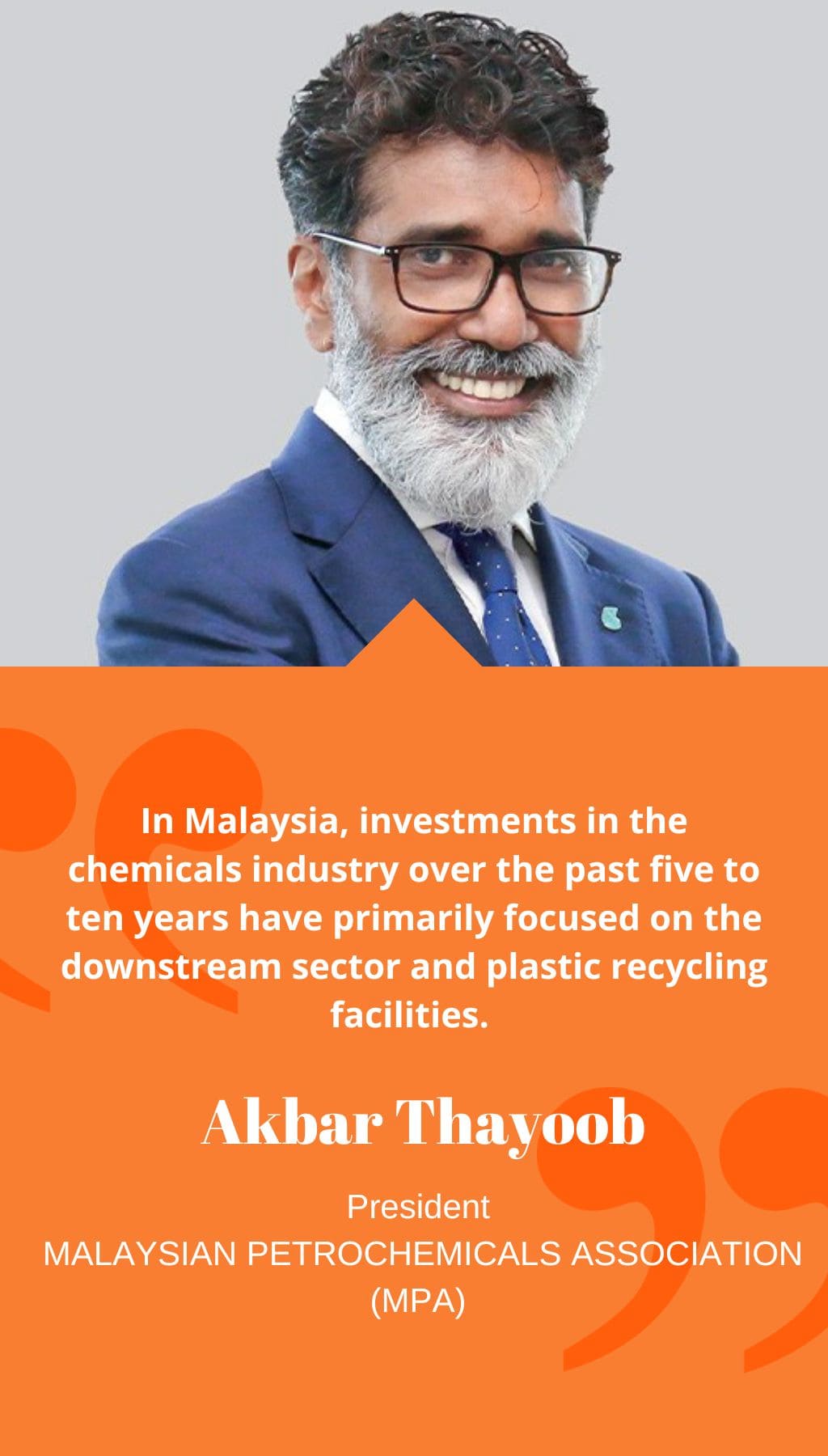
- Malaysia | 19 April 2023

Can you provide an introduction to MPA for our international audience?
Certainly! MPA (Malaysian Petrochemicals Association) was established in 1997 during a crucial period when the Malaysian petrochemicals industry was transitioning from basic chemicals to value-added derivatives. As Malaysia aimed to establish itself as a significant player in the petrochemicals sector, there was a growing need for a unified voice to represent both local and international investors. Thus, MPA was formed. Today, MPA consists of 27 selected members representing 100% of the traditional petrochemicals industry in the country. Initially, our membership was limited to petrochemical manufacturers such as PETRONAS Chemicals Group, Lotte Chemicals, BASF, Reliance, Idemitsu, and Kaneka. However, we are now expanding the organization to include a wider range of chemical companies, including service and technology providers, downstream SMEs, and other industry enablers. The line between petrochemicals and other chemicals is blurring as the industry becomes more integrated and diversified.
How is the role of MPA evolving within the industry?
MPA’s main roles are to promote the growth of the petrochemicals industry in Malaysia, advocate for the interests of its members, and provide a platform for collaboration and knowledge sharing among industry players. As the industry and economic landscape evolve, MPA’s roles are also evolving, especially towards a more sustainable development. In this regard, MPA is increasingly focused on encouraging the adoption of new technologies and sustainable practices among its members and the broader petrochemicals value chain. Additionally, we act as a promoter of Responsible Care, connecting the industry in Malaysia with global practices. Our recent Petrochemicals Sustainability Conference (PSC) in 2022 revolved around the theme of “future-ready petrochemicals,” reflecting the ongoing commitment of MPA to sustainability in its role.
Considering the topic of “future-ready petrochemicals,” how prepared is the Malaysian industry for the green transition?
The petrochemicals industry plays a vital role in the energy transition. For instance, renewable energies rely on petrochemicals to provide advanced materials for solar panels and wind turbines. However, it is important to ensure that the industry seizes the opportunity presented by the green transition. Prioritization is key since it is not possible to tackle every aspect simultaneously. With proper planning, collaboration, and commitment, the petrochemicals industry in Malaysia can prove itself as an indispensable part of the solution for the energy transition.
What will be required for the industry to contribute effectively to the energy transition, and what barriers does it face?
Petrochemical players in Malaysia, as well as globally, require a data-driven baseline to systematically measure and navigate their journeys toward achieving net-zero emissions. Building capability in this area will necessitate not only the use of software but also the development of talent and the implementation of supportive government regulations. The government is currently preparing an industry roadmap, in collaboration with key industry players, to provide a blueprint for the future growth of the sector. Financing is also a crucial aspect. The International Energy Agency (IEA) estimates that the net-zero transition for the petrochemicals industry alone will require trillions of dollars. To attract green financing, the industry needs to meet accreditation standards, underscoring the importance of establishing benchmarks and relevant key performance indicators (KPIs).
What are the main opportunities for the Malaysian chemicals industry?
In Malaysia, investments in the chemicals industry over the past five to ten years have primarily focused on the downstream sector and plastic recycling facilities. While the domestic market may not offer significant opportunities for scale, the ASEAN block, comprising over 600 million people, is the third-largest population in the world after China and India. This vibrant, educated, and middle-class society presents a booming market for the industry. In addition to tapping into this market, Malaysia has the opportunity to develop increasingly complex and specialized formulations. Designing customer-driven solutions requires knowledge sharing and co-development rather than relying solely on in-house capabilities. In today’s highly dynamic competitive landscape, success in the industry lies in offering well-defined, specifically targeted products rather than competing with undifferentiated ones.
Do you have a final message?
To achieve the targets set in the Paris Agreement, the world should have reached at least 20% of its 2050 sustainability goals by 2030. The initial phase is undoubtedly the most challenging, but with the right foundations in place, progress will accelerate exponentially in the coming decades. The petrochemicals industry, with its focus on sustainability and collaboration, is poised to play a significant role in shaping a more sustainable future.














